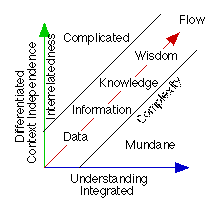It is quite stunning to observe meetings of education professionals. There seems to be a kind of unwritten “law of convenient ignorance” on the basis of which every attendant pushes aside what they know about the successful facilitation of meetings – including myself.
It begins with the preparation and the documents produced for that purpose. It continues with team meetings which are much more lax and relaxed. It goes on with the delivery of sessions. It affects the documentation. And it has a great impact on the quality of the meeting, its outcome, its visibility, its efficiency.
Don’t get me wrong — this is not a flame-post! I am constantly doing this myself — ignoring professional standards of educational work based on the (unreflected and untrue) assumption that everything will work out just fine because we have done this for so long. It is a phenomenon I have observed over many years and discussed with many friends and colleagues and which is, it seems, a fact.
In addition, meetings often do not even attempt to consider the most basic kind of knowledge management, understood as

…”techniques used for the systematic collection, transfer, security and management of information within organisations, along with systems designed to help make best use of that knowledge; in particular tools and techniques designed to preserve the availability of information held by key individuals and facilitate decision making and reducing risk.”
Source: Wikipedia
Accessed on March 18, 2006

And I have no idea why.
But I do know what it feels like: Re-living life from gastrulation onwards.
So my question remains and goes out to you:
Why do we — people trained at facilitating conversations that matter — converse our knowledge in our own meetings?
Comments
4 responses to “Gastrulation re-lived”
Well….. I guess it is because facilitators dont always feel comfortable being participants and being facilitated, so they rather get frustrated without facilitation than with …. On the other hand, it might also be because meetings organised for people who do facilitation are often not organised by people who do facilitation…. And meetings are not training courses, so people organising them assume good practices from TCs do not really apply. Finally and most of all, meetings are organised on short notice, which leads to rushed preparation…. Does this help?
Uhu, the famous phenomenon of trainers being participants for a change…
I can of course only speak for myself: I like being facilitated well, and the crux is that naturally my demands and expectations are way beyond anything an average participant of a training activity would have. But is that bad?
Meetings are not training courses, I agree. Yet, methods used in training settings such as the World Café Debate, such as Open Space, such as Image Theatre can all be applied in a meeting of any kind.
And it would have several advantages, such as:
trainers would have fun trying these out in a participant’s role
meeting organisers could concentrate on contents and outsource the actual facilitation if wanted and/or needed
junior trainers would be able to learn about how methods can be adaped to and applied in different contexts and situations
Just a short list to begin with…
Taking my own comment further: Assuming that these advantages are true and realistic, the question comes up why facilitation and meetings don’t come together.
Is it because these meetings are not considered important?
Is it because facilitation is considered trainer’s play?
Is it because of a believe that trainers don’t need to be facilitated?
Or don’t want to be facilitated, for that matter?
… ?
In answer to all three questions:
– it is a matter of the problem of quality.
– some trainers accept there is such a thing and some dont
– some trainers dont want to be subjected to assessment by others, even if it is only an informal assessment and never ventures further than the audience’s brain
– some trainers are tired of facilitation as they do it for a living
– being a participant can be a lazy experience for a trainer
….